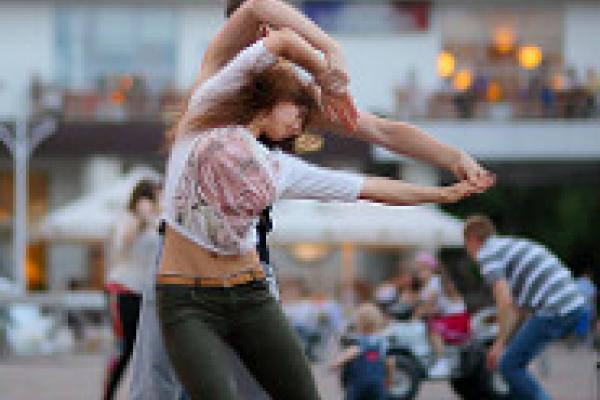
Join the Folklore Student Association for a discussion that explores the specificities of engaging in ethnographic study focused on dance forms and other practices that are based on physical movement.
Panelists:
Ann Cooper Albright, Dance, Oberlin College
A dancer and scholar, Ann Cooper Albright is Professor and Chair of Dance at Oberlin College and President of the Society of Dance History Scholars. Combining her interests in movement and cultural theory, she is involved in teaching a variety of courses and workshops that seek to engage participants in both practices and theories of the body. She is the author of Engaging Bodies: the Politics and Poetics of Corporeality (2013), which won the Selma Jeanne Cohen Prize from the American Society for Aesthetics; Modern Gestures: Abraham Walkowitz Draws Isadora Duncan Dancing (2010); Traces of Light: Absence and Presence in the Work of Loie Fuller (2007); Choreographing Difference: the Body and Identity in Contemporary Dance (1997) and co-editor of Moving History/Dancing Cultures (2001) and Taken By Surprise: Improvisation in Dance and Mind (2003). The book, Encounters with Contact Improvisation (2010), is the product of one of her adventures in writing and dancing and dancing and writing with others. Ann is founder and director of Girls in Motion, an award-winning afterschool program in the Oberlin public schools and co-director of Accelerated Motion: Towards a New Dance Literacy. Her new book project, Gravity Matters: finding ground in an unstable world, focuses on contemporary American embodiment post-9/11.
Meiver De la Cruz, Dance, Oberlin College
Meiver De la Cruz’s ethnographic dissertation research investigates Arab American movement practices and performance (social, staged, and ritual dance) as well as formal Arab dance pedagogy in the US, to locate dance as a primary site for the creation, and neoliberal circulation of Arab-American identity. As a performance artist, she creates work that address the intersections of globalization, racism, and sexual violence, and has used dance and performance as part of community organizing and empowerment work. She is currently a Visiting Instructor of dance at Oberlin College teaching dance studies and Arab dance technique.
Katherine Borland, Comparative Studies, Ohio State University
Katherine Borland is Associate Professor of Comparative Studies and Director of the Center for Folklore Studies at OSU. She has published a number of articles on Latin American dance forms, ranging from Nicaraguan folkdance to contemporary salsa as practiced by diverse groups in northern New Jersey. Her interest in dance is part of a larger concern for embodied practice, sites of diversity, and women’s expressive culture.
Danielle Schoon, Near Eastern Languages & Cultures, Ohio State University
Danielle V. Schoon is an urban anthropologist with interdisciplinary training and interests in Turkish studies, Romani studies, and performance studies. She has an MA in Dance from the World Arts and Cultures program at UCLA and a dual PhD in Cultural Anthropology and Middle Eastern Studies from the University of Arizona. Dr. Schoon's work is in Romani ("Gypsy") performance and identity in Turkey. She conducted longterm fieldwork in Istanbul as a Fulbright-Hays research fellow and recently resided in Konstanz, Germany for two months as a guest scholar of the Institute for Advanced Study at the University of Konstanz. Dr. Schoon is an Associate Editor of the Journal of Gypsy Studies and has published in the journals City and City and Society. She is also a teacher and performer of Egyptian and Turkish Romani dance. She is currently a Lecturer in the departments of Near Eastern Languages and Cultures (NELC) and Dance at The Ohio State University.
Photo credit: Flickr user Vladimir Pustovit
